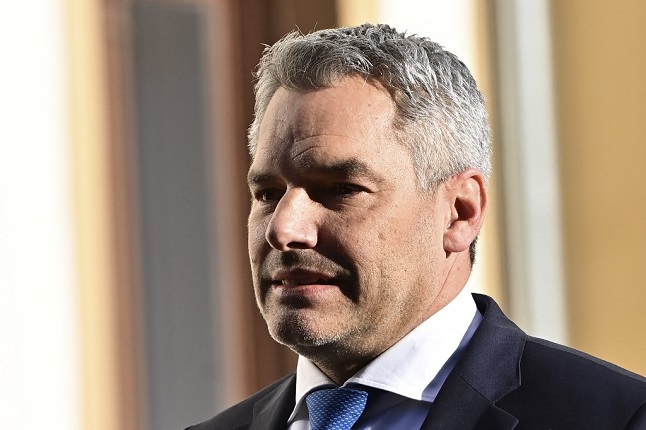The drama of the Austrian situation is especially clear when compared with neighbour Germany, which also gets a new chancellor this week. Outgoing German leader Angela Merkel will have overlapped with no fewer than ten Austrian counterparts during her time in office — and still won’t be the longest-serving post-war leader of that country.
The reason for the particularly short term of Austria’s most recent chancellor, Alexander Schallenberg, is fairly straightforward at least. He was only ever intended as a temporary replacement for his predecessor Sebastian Kurz, who retained his role of party leader until his unexpected departure from politics last week.
READ ALSO: Who is Alexander Schallenberg?
“The party was not able to make a clear cut and installed someone in the Chancellery who would have been willing to hand over his position to Kurz as soon as he requested that,” political analyst Thomas Hofer told The Local, referring to the situation that gave Schallenberg to be dubbed a ‘Shadow Chancellor’.
“Now, at least, [the governing People’s Party] know that Kurz won’t return any time soon and can prepare for the next election.”
Some of the volatility of recent years can be attributed directly to Kurz himself, who shot to power as the world’s youngest democratically elected leader at the time, ousting his predecessor Reinhold Mitterlehner and going on to become Austria’s first leader to lose his job through a no-confidence vote, before returning six months later.
To Anton Pelinka, a professor in politics and nationalism, Kurz is more a symptom than the cause of Austria’s political upheaval, the real roots of which lie in the collapse of a two-party system. The former chancellor was simply able to exploit fault lines that were already there.
Like many European political systems, the proportional representation system makes it unlikely for a single party to win a straight majority in Austria. But that didn’t always lead to the unsteady coalitions and frequent changes that have marked recent years.
“The reason for the instability has been the decline of the two traditionally dominant mainstream parties – the conservative People’s Party (ÖVP) and the Social Democrats (SPÖ),” Anton Pelinka, a professor in politics and nationalism, told The Local.
READ ALSO: What’s going on with Austrian politics?
In post-war Austria, the political landscape has mostly been dominated by the centre-left SPÖ and conservative ÖVP, either governing alone, in a grand coalition, or since the 1980s occasionally in coalition with the far-right FPÖ (which, around that time, changed its strategy to position itself as a populist anti-establishment party).
“The brief era under Kurz gave the wrong impression that the People’s Party would again rise to its old strength. Kurz provided for an illusion of being able to overcome the instability,” Pelinka said.
This decline in support for the ÖVP and SPÖ since the late 20th century has given more influence to the FPÖ (today the third largest parties and one of Europe’s most successful populist parties on the right), as well as to the Greens, and the youngest party NEOS.
This has led to at times unlikely coalitions, not least the current pairing of the conservative ÖVP and Greens, with tensions particularly on the issues of migration and corruption. It was the Greens who eventually forced Kurz to step down, saying they would pull the plug on the coalition otherwise.
Thomas Hofer sees a trend towards increased polarization in politics, which has made the coalitions unsteady — not only the previous grand coalition, which collapsed in 2017 when Kurz pulled the plug on it, but also the current alliance between the ÖVP and Greens.
READ ALSO: The rise and fall of Sebastian Kurz
“[The current coalition parties] really do come from opposite sides of the political spectrum. So, there are tensions frequently and this also contributes to the impression of permanent turmoil,” said Hofer.
“If you think back to the migration crisis, or the presidential election in 2016, you could already detect a heavy split in politics and society. This results in a very loaded political rhetoric and increases tensions, also on the personal level,” he said.
“What we’ve also seen, is an increase in “dirty campaigning” in the last couple of campaigns. And what a lot of politicians, including Mr Kurz, do is to strictly believe in polls. They are trying to imitate the opinion of the majority – and that also results in volatility and a very short-term approach in politics.”
So as former Interior Minister Karl Nehammer takes office, what are the chances the coalition will survive to the planned 2024 election?
Hofer expects the coalition to fracture during 2022, but notes that early elections would not be in the ÖVP’s failure and that the Greens, who entered government for the first time only in 2020, may want to “enjoy their new powerful position within government a little longer”. He added it was unlikely the coalition would be broken during the midst of the pandemic crisis.
As for the longer term, both experts questioned by The Local thought it unlikely that stability would return.
“I wouldn’t speak of “years”. Austrian politics is moving and changing far too fast to plan for such a time span. At least since 2015, the political system has to deal with permanent crisis situations. So it’s hard to predict how this will play out in the coming months,” said Hofer.
“I think there is no serious chance that the two traditional mainstream parties will regain their old dominance. I think the most realistic scenario is the Italianization of Austrian politics – high volatility with new parties and weakened old parties, and rather unstable coalition governments of three and more coalition partners,” said Pelinka.



 Please whitelist us to continue reading.
Please whitelist us to continue reading.
Member comments